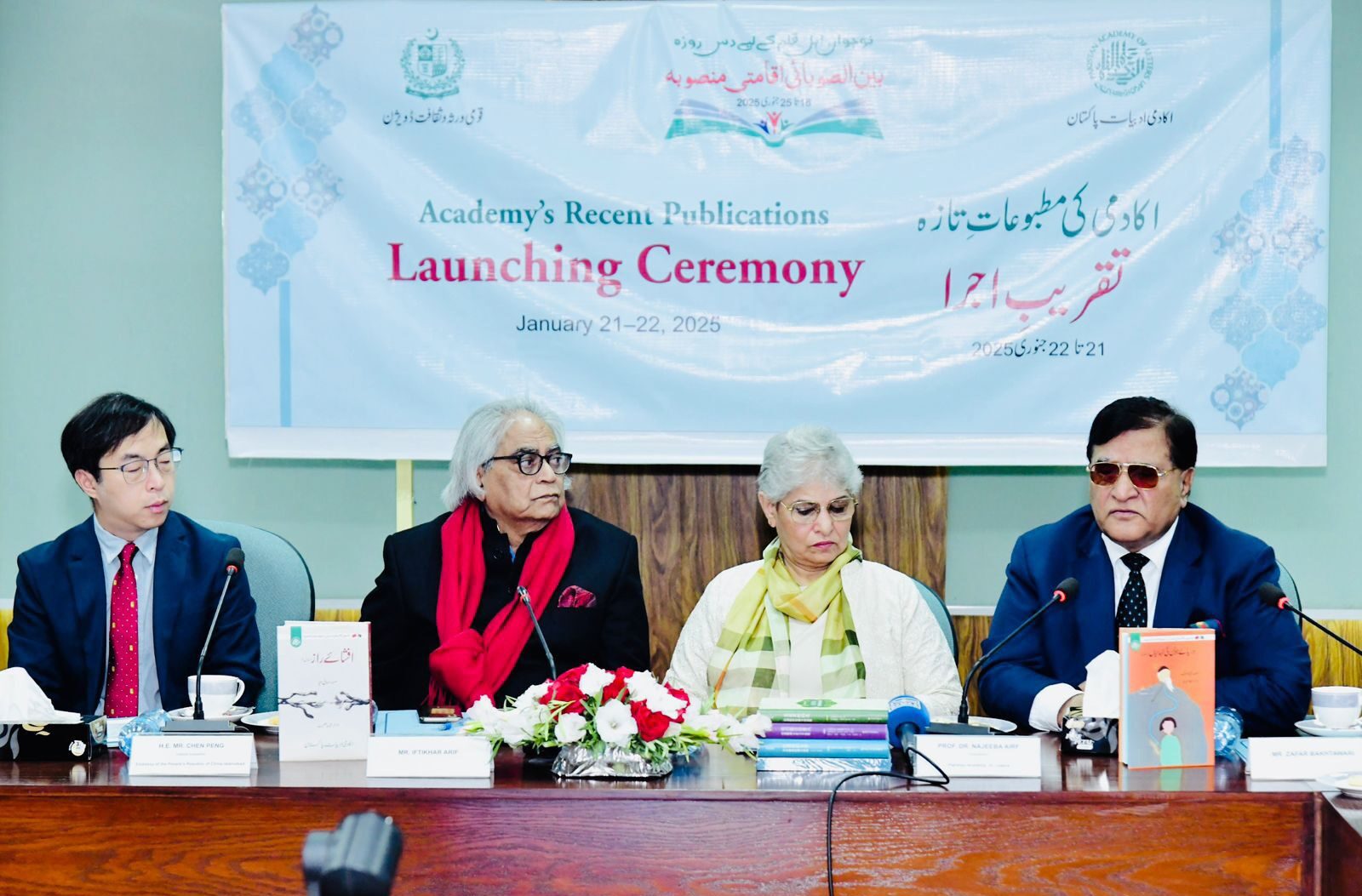WNAM REPORT: Chinese Cultural Counselor Chen Ping stated that Chinese literature is renowned worldwide for its depth and diversity. The Urdu translations of three Chinese classical novels provide an excellent opportunity for Pakistani readers to connect with Chinese culture and literature. He expressed these views as the chief guest at the book-launch ceremony of Urdu translations of three Chinese classical novels organized by the Pakistan Academy of Letters (PAL) yesterday. The event was hosted by the Chairperson of PAL, Dr. Najeeba Arif, and presided over by renowned poet Iftikhar Arif.
Chairman of the Pakistan Cultural Forum Zafar Bakhtawari, former ambassador Abrar Hussain Shah, and eminent writer Waheed Ahmed were the guests of honor, while Asim Butt, Dr. Riaz Adil, and Dr. Safdar Rasheed discussed the books in detail.
Dr. Najeeba Arif remarked that these translations will deepen the literary and cultural ties between the two nations. She shed light on the history of Pakistan-China literary and cultural relations and highlighted the efforts made to strengthen them. She stated that PAL has always served as a bridge to introduce Chinese literature to Pakistani readers. The Urdu translations of renowned Chinese classical novels mark a historic step, enabling Pakistani readers to better understand Chinese civilization, history, and traditions.
Dr. Najeeba Arif added that these novels reflect Chinese society, its values, and its struggles, offering Pakistani readers not only an introduction to Chinese literature but also a means to bring the two nations closer. She appreciated the collaboration between PAL and the Chinese Embassy in completing this significant project, which will give new dimensions to the literary and cultural relations between the two countries.
She also emphasized that the philosophical and moral themes embedded in Chinese literature would offer a unique experience for Pakistani readers. She reiterated PAL’s commitment to future initiatives aimed at strengthening literary connections between Pakistan and China so that writers, poets, and readers from both countries can better understand each other’s cultures. She concluded by extending her gratitude to the Chinese Embassy, translators, and the PAL team for their relentless efforts.
Chen Ping stated that the relationship between China and Pakistan is not confined to political and economic cooperation but also holds unique importance in the realm of literature and culture. The translation of Chinese classical novels into Urdu will further deepen these relations. These stories encapsulate the history, values, and societal life of Chinese civilization, offering a new experience for Pakistani readers. Literature, he said, does not merely connect languages but also hearts.
Iftikhar Arif highlighted that these translations are not just literary works but bridges between two civilizations. He underscored the profound philosophical and moral aspects of Chinese literature, noting that these stories portray life’s realities in a unique way. This initiative, he said, would take Pak-China friendship to new heights, enabling mutual understanding and closeness through literature.
Zafar Bakhtawari emphasized that literary translations are an excellent medium for cultural exchange. He lauded the joint efforts of PAL and the Chinese Embassy, expressing hope that more Chinese literature will be translated into Urdu in the future. The relationship between Pakistan and China, he said, is a global example, and culture and literature play an indispensable role in its strength. These translations will not only acquaint Pakistani readers with Chinese literature but also help them understand the lifestyle, dreams, and experiences of the Chinese people. Literature, he added, is a universal language that transcends boundaries and fosters closer ties between Pakistan and China.
Former Ambassador Abrar Hussain Shah remarked that the friendship between China and Pakistan is exemplary in every field, and these translations will further solidify this relationship at an intellectual and literary level.
Waheed Ahmed stated that Chinese classical novels profoundly reflect human emotions, the evolution of civilizations, and social issues. Their Urdu translations are a rare gift for Pakistani readers.
Asim Butt, Dr. Riaz Adil, and Dr. Safdar Rasheed highlighted the depth of stories and characters portrayed in Chinese literature. They noted that these tales are not just literary masterpieces but also a medium to understand different civilizations. The depiction of life’s truths in these novels, the struggles of their characters, their triumphs, and their dreams introduce readers to a new world. Translating these works into Urdu is a commendable initiative that will bring Pakistani readers closer to Chinese civilization.


